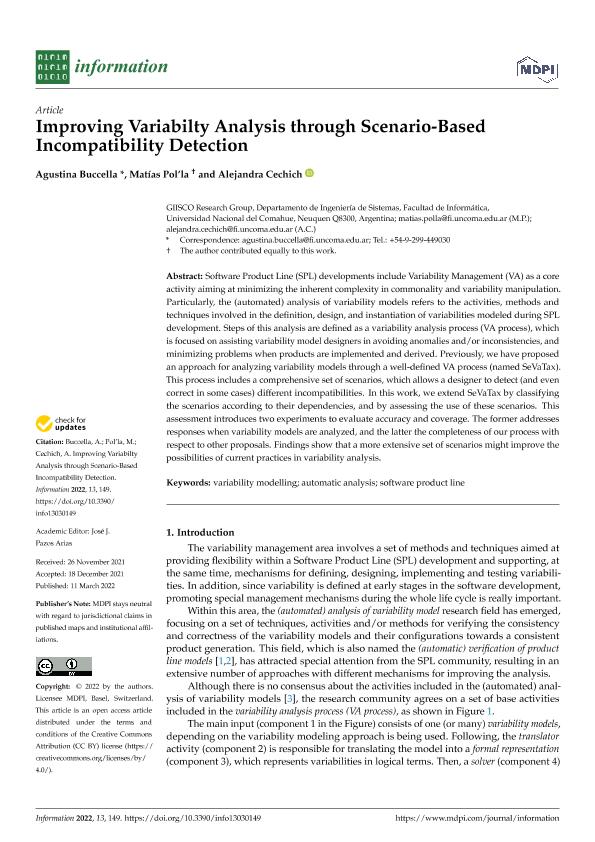Artículo
Improving Variabilty Analysis through Scenario-Based Incompatibility Detection
Fecha de publicación:
03/2022
Editorial:
Multidisciplinary Digital Publishing Institute
Revista:
Information (Switzerland)
ISSN:
2078-2489
Idioma:
Inglés
Tipo de recurso:
Artículo publicado
Clasificación temática:
Resumen
Software Product Line (SPL) developments include Variability Management (VA) as a core activity aiming at minimizing the inherent complexity in commonality and variability manipulation. Particularly, the (automated) analysis of variability models refers to the activities, methods and techniques involved in the definition, design, and instantiation of variabilities modeled during SPL development. Steps of this analysis are defined as a variability analysis process (VA process), which is focused on assisting variability model designers in avoiding anomalies and/or inconsistencies, and minimizing problems when products are implemented and derived. Previously, we have proposed an approach for analyzing variability models through a well-defined VA process (named SeVaTax). This process includes a comprehensive set of scenarios, which allows a designer to detect (and even correct in some cases) different incompatibilities. In this work, we extend SeVaTax by classifying the scenarios according to their dependencies, and by assessing the use of these scenarios. This assessment introduces two experiments to evaluate accuracy and coverage. The former addresses responses when variability models are analyzed, and the latter the completeness of our process with respect to other proposals. Findings show that a more extensive set of scenarios might improve the possibilities of current practices in variability analysis.
Palabras clave:
AUTOMATIC ANALYSIS
,
SOFTWARE PRODUCT LINE
,
VARIABILITY MODELLING
Archivos asociados
Licencia
Identificadores
Colecciones
Articulos(CCT - PATAGONIA CONFLUENCIA)
Articulos de CTRO.CIENTIFICO TECNOL.CONICET - PATAGONIA CONFLUENCIA
Articulos de CTRO.CIENTIFICO TECNOL.CONICET - PATAGONIA CONFLUENCIA
Citación
Buccella, Agustina; Pol'la, Matias Esteban; Cechich, Susana Alejandra; Improving Variabilty Analysis through Scenario-Based Incompatibility Detection; Multidisciplinary Digital Publishing Institute; Information (Switzerland); 13; 3; 3-2022; 1-27
Compartir
Altmétricas




